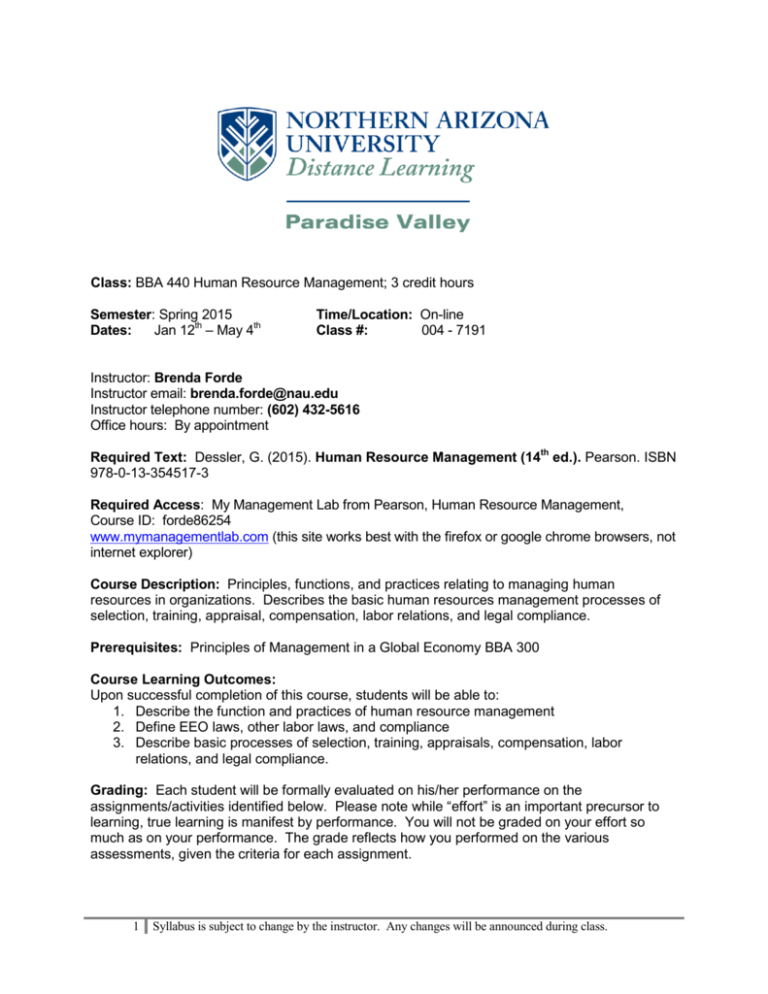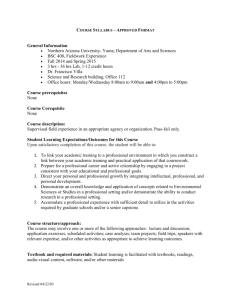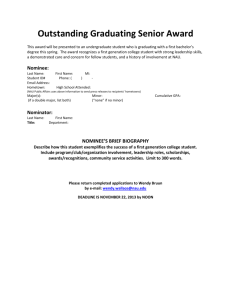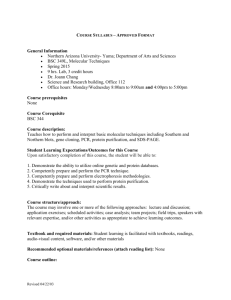Class: BBA 440 Human Resource Management
advertisement

Class: BBA 440 Human Resource Management; 3 credit hours Semester: Spring 2015 Dates: Jan 12th – May 4th Time/Location: On-line Class #: 004 - 7191 Instructor: Brenda Forde Instructor email: brenda.forde@nau.edu Instructor telephone number: (602) 432-5616 Office hours: By appointment Required Text: Dessler, G. (2015). Human Resource Management (14th ed.). Pearson. ISBN 978-0-13-354517-3 Required Access: My Management Lab from Pearson, Human Resource Management, Course ID: forde86254 www.mymanagementlab.com (this site works best with the firefox or google chrome browsers, not internet explorer) Course Description: Principles, functions, and practices relating to managing human resources in organizations. Describes the basic human resources management processes of selection, training, appraisal, compensation, labor relations, and legal compliance. Prerequisites: Principles of Management in a Global Economy BBA 300 Course Learning Outcomes: Upon successful completion of this course, students will be able to: 1. Describe the function and practices of human resource management 2. Define EEO laws, other labor laws, and compliance 3. Describe basic processes of selection, training, appraisals, compensation, labor relations, and legal compliance. Grading: Each student will be formally evaluated on his/her performance on the assignments/activities identified below. Please note while “effort” is an important precursor to learning, true learning is manifest by performance. You will not be graded on your effort so much as on your performance. The grade reflects how you performed on the various assessments, given the criteria for each assignment. 1 Syllabus is subject to change by the instructor. Any changes will be announced during class. Your final course grade will constitute the following components: Grade as COMPONENT Discussion Questions (7) Videos Assignments (4) Simulation Assignments (8) Chapter Quizzes (5) Individual Writing Case Final Exam Total Grade scale: 90% = A, 80% = B, 70% = C, 60% = D. Percent / Points 28% 280 4 40 8 80 25 250 15 150 20 200 100 1,000 Discussion Questions - There are seven weeks of discussion questions for this course. They are noted on the course schedule below in the syllabus and can also be found in the applicable weekly folders in Blackboard. We will have discussions on Weeks 1, 3, 4, 7, 8, 11, and 13. Each week of discussion questions is worth 40 points. To earn all 40 points there is a quantity and quality factor. For quantity you need to post your initial response by Thursday midnight and have a minimum of two replies completed by Sunday midnight. You may reply to a fellow student or to the instructor to earn this quantity factor. For quality your initial response should be comprehensive and fully supported. If you answer in a sentence of two you do not have enough information. Your replies should be substantive in that they add new information or debate a point. They should not be mere agreements or compliments. The discussion questions are like our classroom time, so let’s be interactive. You need to log into the discussion a minimum of three times a week. These discussion questions are worth 28% of your final grade so be sure to do some quality work! Video and Simulation Assignments – These assignments are noted in the course schedule below in the syllabus as well as in our weekly folders in Blackboard. The Video and Simulations assignments allow us to apply the chapter information in real life situation and provide a bit more interest than just straight writing types of assignments. I found them quite interesting! All of these assignments are located in mymanagmentlab and will be done online. Instructions to access this site can be found in our Week 1 folder in Blackboard. For the Video Assignments there is a ‘check answer’ option so you can ensure you are on track with these and it allows you to revise your answer if necessary. If you revise your answer be sure to click on the save button. When completed click on the OK. Chapter Quizzes – There are a total of five overall quizzes. These are all located in mymanagmentlab. When you get ready to take these you will notice they are broken out by chapter. For example Quiz 1 encompasses three chapters so there are three chapter quizzes to take. The five overall quizzes are comprised of 25 multiple choice questions with each question worth 2 points. You must complete each chapter quiz in one sitting as you cannot go in and out of them. The quizzes are not timed and you can take them only once. Take your time as the quizzes are worth 25% of your grade. Individual Writing Case – Textbook case, Bandag case, Appendix B, pg. 589. The assignment will consist of about 2,000 words and address the following: 2 Syllabus is subject to change by the instructor. Any changes will be announced during class. a. b. Describe the background of the case and main concerns. Answer case questions in a separate paragraph/section for each question. Use appropriate headings for each question. Include title page, introductory, and closing paragraphs. Main ideas need to be supported with research and sources cited and listed in a separate reference page. d. Search Google Scholar (do not use Google) and find documents to support your answers. Write in third person (no I, you, or we). Use APA format, double space paper, and use headings. This is due by 4/26 midnight. Final Exam – The final exam needs to be completed by 5/4 midnight. It will be comprehensive covering all our chapters. General Course Information: 1. Class week: Each week, our on-line class starts on Monday and closes on Sunday at 11:59 pm (AZ time). 2. Assignments are due by Sunday at 11:59pm (AZ time). Late work is not accepted after the due date. 3. Students are expected to read all posts from other students and from the instructor. This is an online class and the success of our communication depends on reading the information posted. Please visit the classroom regularly (three times a week minimum). 4. You will notice our class in Blackboard is organized by Weekly Folders. Everything you need for that week can be found in the folder. Course Schedule Week Week 1 1/12 -1/18 Week 2 1/19 – 1/25 3 Objective Introduction and overview of the course. Be sure to read the syllabus and become familiar with the requirements Discussion Question: Post your biography Acknowledge reading and understanding the syllabus Sign up for mymanagementlab Read Chapter 1 (Introduction to Human Resource Management) Chapter 1 Simulation: HR Read Chapter 2 (Equal Opportunity and the Law) Read Chapter 3 (Human Resources Management Strategy and Analysis) Chapter 2 Video: UPS Chapter 3 Simulation: Managing in a Global Environment Chapter Quiz #1 Syllabus is subject to change by the instructor. Any changes will be announced during class. Due Date 1/18 1/25 Week 3 1/26 – 2/1 Week 4 2/2 – 2/8 Week 5 2/9 -2/15 Week 6 2/16 – 2/22 Week 7 2/23 – 3/1 Week 8 3/2 – 3/8 Week 9 3/9 – 3/15 Week 10 3/16 – 3/22 Week 11 3/23 – 3/29 Week 12 3/30 – 4/5 Week 13 4/6 – 4/12 4 Read Chapter 4 (Job Analysis and the Talent Management Process) Chapter 4 Video: The Weather Channel – Talent Management Discussion Question: Carter Cleaning Company Case on page 117 Read Chapter 5 (Personnel Planning and Recruiting) Chapter 5 Simulation: HR and Diversity Discussion Question: Recruit and Retain a Diverse Workforce Read Chapter 6 (Employee Testing and Selection) Read Chapter 7 (Interviewing Candidates) Chapter Quiz #2 Read Chapter 8 (Training and Developing Employees) Chapter 8 Simulation: Individual Behavior Read Chapter 9 (Performance Management and Appraisal) Read Chapter 10 (Managing Employee Retention, Engagement, and Careers) Chapter 10 Simulation: Managing Your Career Chapter Quiz #3 Discussion Question: Career Management Interview Read Chapter 11 (Establishing Strategic Pay Plans) Chapter 11 Simulation: Organizational Structure Discussion Question: Executive Pay Article Read Chapter 12 (Pay for Performance and Financial Incentives) Read Chapter 13 (Benefits and Services) Chapter 12 Simulation: Motivation Chapter Quiz #4 Spring Break!! Read Chapter 14 (Ethics, Employee Relations, and Fair Treatment at Work) Chapter 14 Simulation: Management and Ethics Discussion Question: Managing Employee Relations 2/1 2/8 2/15 2/22 3/1 3/8 3/15 3/29 Read Chapter 15 (Labor Relations and Collective Bargaining) Read Chapter 16 (Employee Safety and Health) Chapter 16 Video: The California Healthcare Foundation: Safety 4/5 Read Chapter 17 (Managing Global Human Resources) Chapter 17 Video: Joby: Global HRM Discussion Question: Establishing Global HRM 4/12 Syllabus is subject to change by the instructor. Any changes will be announced during class. Week 14 4/13 – 4/19 Week 15 4/20 – 4/26 Week 16 4/27 – 5/4 Read Chapter 18 (Managing Human Resources in Small and Entrepreneurial Firms) Chapter Quiz #5 Individual Case Due Reading and Studying Week Final Exam (Comprehensive) – Good Luck!! 4/19 4/26 5/4 University Policies Safe Environment Policy: NAU’s Safe Working and Learning Environment Policy prohibits sexual harassment and assault, and discrimination and harassment on the basis of sex, race, color, age, national origin, religion, sexual orientation, gender identity, disability, or veteran status by anyone at this university. Retaliation of any kind as a result of making a complaint under the policy or participating in an investigation is also prohibited. The Director of the Office of Affirmative Action & Equal Opportunity (AA/EO) serves as the university’s compliance officer for affirmative action, civil rights, and Title IX, and is the ADA/504 Coordinator. AA/EO also assists with religious accommodations. You may obtain a copy of this policy from the college dean’s office or from the NAU’s Affirmative Action website nau.edu/diversity/. If you have questions or concerns about this policy, it is important that you contact the departmental chair, dean’s office, the Office of Student Life (928523-5181), or NAU’s Office of Affirmative Action (928) 523- 3312 (voice), (928) 523-9977 (fax), (928) 523-1006 (TTD) or aaeo@nau.edu. Students with Disabilities: If you have a documented disability, you can arrange for accommodations by contacting Disability Resources (DR) at 523-8773 (voice) or 523-6906 (TTY), dr@nau.edu (e-mail) or 928-523-8747 (fax). Students needing academic accommodations are required to register with DR and provide required disability related documentation. Although you may request an accommodation at any time, in order for DR to best meet your individual needs, you are urged to register and submit necessary documentation (www.nau.edu/dr) 8 weeks prior to the time you wish to receive accommodations. DR is strongly committed to the needs of student with disabilities and the promotion of Universal Design. Concerns or questions related to the accessibility of programs and facilities at NAU may be brought to the attention of DR or the Office of Affirmative Action and Equal Opportunity (523-3312). Academic Contact Hour Policy: Based on the Arizona Board of Regents Academic Contact Hour Policy (ABOR Handbook, 2-224), for every unit of credit, a student should expect, on average, to do a minimum of three hours of work per week, including but not limited to class time, preparation, homework, studying. Academic Integrity: Integrity is expected of every member of the NAU community in all academic undertakings. Integrity entails a firm adherence to a set of values, and the values most essential to an academic community are grounded in honesty with respect to all intellectual efforts of oneself and others. Academic integrity is expected not only in formal coursework situations, but in all University relationships and interactions connected to the educational process, including the use of University resources. An NAU student’s submission of work is an implicit declaration that the work is the student’s own. All outside assistance should be acknowledged, and the student’s 5 Syllabus is subject to change by the instructor. Any changes will be announced during class. academic contribution truthfully reported at all times. In addition, NAU students have a right to expect academic integrity from each of their peers. Individual students and faculty members are responsible for identifying potential violations of the university’s academic integrity policy. Instances of potential violations are adjudicated using the process found in the university Academic Integrity Policy. Research Integrity: The Responsible Conduct of Research policy is intended to ensure that NAU personnel including NAU students engaged in research are adequately trained in the basic principles of ethics in research. Additionally, this policy assists NAU in meeting the RCR training and compliance requirements of the National Science Foundation (NSF)-The America COMPETES Act (Creating Opportunities to Meaningfully Promote Excellence in Technology, Education and Science); 42 U.S.C 18620-1, Section 7009, and the National Institutes of Health (NIH) policy on the instruction of the RCR (NOT-OD-10-019; “Update on the Requirement for Instruction in the Responsible Conduct of Research”). For more information on the policy and the training activities required for personnel and students conducting research, at NAU, visit: http://nau.edu/Research/Compliance/Research-Integrity/ Sensitive Course Materials: University education aims to expand student understanding and awareness. Thus, it necessarily involves engagement with a wide range of information, ideas, and creative representations. In the course of college studies, students can expect to encounter—and critically appraise—materials that may differ from and perhaps challenge familiar understandings, ideas, and beliefs. Students are encouraged to discuss these matters with faculty. Classroom Disruption Policy: Membership in the academic community places a special obligation on all participants to preserve an atmosphere conducive to a safe and positive learning environment. Part of that obligation implies the responsibility of each member of the NAU community to maintain an environment in which the behavior of any individual is not disruptive. Instructors have the authority and the responsibility to manage their classes in accordance with University regulations. Instructors have the right and obligation to confront disruptive behavior thereby promoting and enforcing standards of behavior necessary for maintaining an atmosphere conducive to teaching and learning. Instructors are responsible for establishing, communicating, and enforcing reasonable expectations and rules of classroom behavior. Each student is responsible for behaving in a manner that supports a positive learning environment and that does not interrupt nor disrupt the delivery of education by instructors or receipt of education by students. The complete classroom disruption policy is in Appendices of NAU’s Student Handbook. Incomplete Policy: An “incomplete” will be given only is a student, through no fault of his/her own, is unable to complete the course and has an excused absence from the final exam. Students receiving this grade must contact the instructor ASAP and no later than the first week of the following term to set up the contract for completing the course. It is the student’s responsibility to ensure that all remaining requirements for an “Incomplete” are satisfied. Withdrawal Policy: The deadline to drop this course is January 22nd 4th without the class appearing as a “W” on your transcript. The last day to drop with a “W” is March 13th. Beyond the date, a drop fee and petition is required (see registrar’s information). Please understand this instance is only for students with special extenuating circumstances beyond their control (so be prepared to provide justification). April 24th is the last day to officially withdraw from the University. 6 Syllabus is subject to change by the instructor. Any changes will be announced during class.






